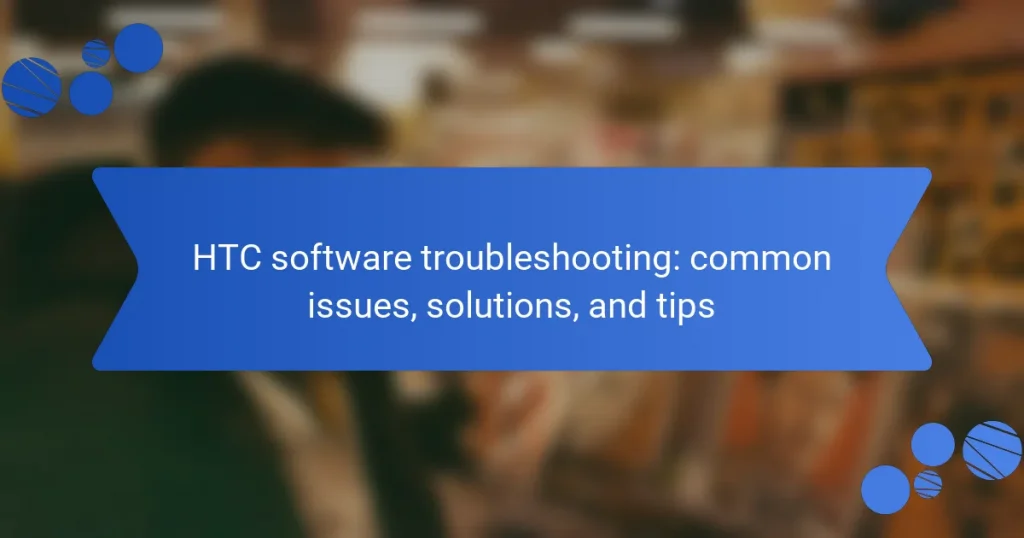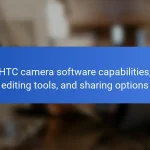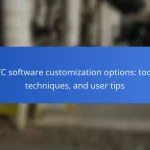HTC software troubleshooting addresses common issues faced by HTC device users, including system crashes, slow performance, app compatibility problems, unexpected restarts, and battery drain. Users often encounter difficulties with software updates and connectivity features such as Wi-Fi and Bluetooth. Effective solutions include performing factory resets, updating software, and clearing app caches to enhance device performance. Regular updates and utilizing built-in optimization tools can lead to improved functionality and user experience. Accessing HTC support resources and engaging with user communities can provide additional insights and troubleshooting assistance.
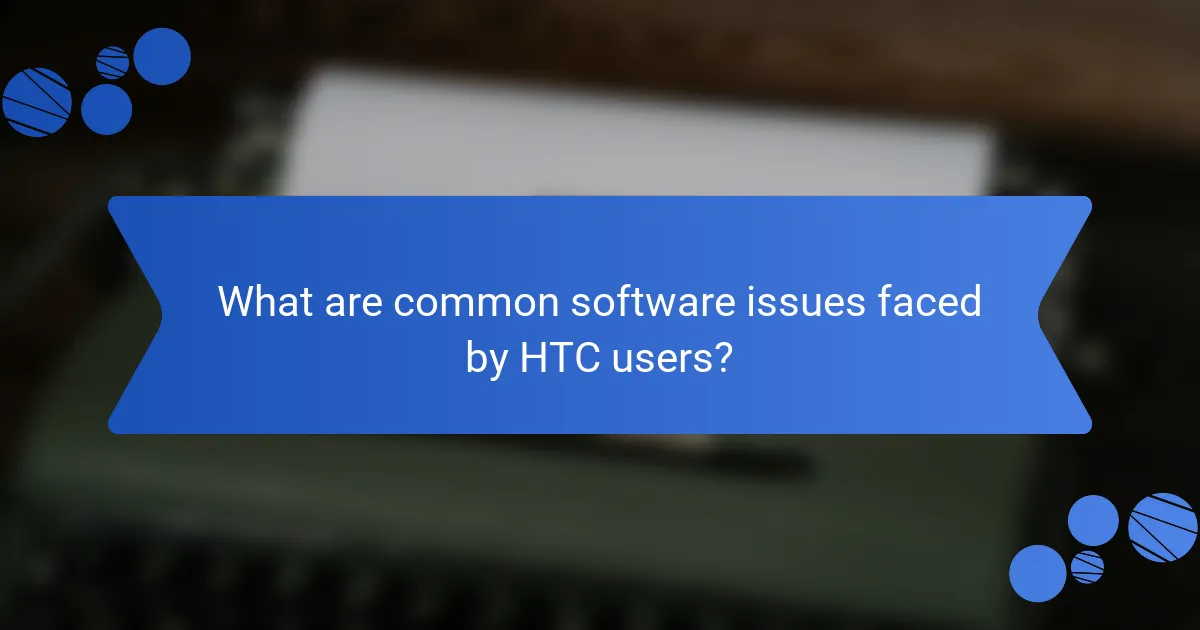
What are common software issues faced by HTC users?
Common software issues faced by HTC users include system crashes, slow performance, and app compatibility problems. Users often report unexpected restarts during operation. Many experience lagging or freezing when using multiple applications. Some HTC devices encounter issues with software updates not installing correctly. Battery drain is another frequent complaint, often linked to software inefficiencies. Additionally, users may face problems with connectivity features like Wi-Fi and Bluetooth. These issues can stem from outdated software or conflicts with installed apps. Regular updates and troubleshooting steps can help mitigate these problems.
How do software issues impact the performance of HTC devices?
Software issues can significantly degrade the performance of HTC devices. These problems often manifest as slow processing speeds, unresponsive applications, and frequent crashes. Software bugs can lead to memory leaks, consuming system resources inefficiently. Incompatibility with updates may also cause devices to lag or behave erratically. Additionally, corrupted files can disrupt normal operations, leading to unexpected shutdowns. HTC devices may experience diminished battery life due to software inefficiencies. Regular updates are crucial for optimizing performance and fixing known issues. Data from user reports indicate that software-related problems are among the most common complaints for HTC users.
What are the signs of software malfunction in HTC smartphones?
Signs of software malfunction in HTC smartphones include frequent crashes and unexpected restarts. Users may experience slow performance or lagging response times. Applications may fail to open or close unexpectedly. There can be issues with connectivity, such as Wi-Fi or Bluetooth not functioning properly. Battery drain may occur more rapidly than usual. Error messages may appear frequently, indicating software problems. Additionally, the device may freeze or become unresponsive at times. These signs are indicative of underlying software issues that may require troubleshooting or updates.
How can users identify specific software problems?
Users can identify specific software problems by observing error messages and system performance issues. Monitoring application crashes or freezes can indicate underlying software faults. Users should also check for updates, as outdated software can lead to functionality problems. Reviewing logs and diagnostic tools can provide insights into software behavior. Running system checks or using troubleshooting wizards can help pinpoint issues. Additionally, seeking user forums or support channels can reveal common problems and solutions. These methods are effective for diagnosing software issues in HTC devices.
What are the most frequently reported software problems in HTC devices?
The most frequently reported software problems in HTC devices include system crashes, app instability, and connectivity issues. Users often experience unexpected shutdowns and freezing during normal use. App crashes occur frequently, particularly with third-party applications. Connectivity issues, such as Wi-Fi and Bluetooth failures, are also common complaints. Some users report problems with software updates, leading to incomplete installations. Battery drain issues may arise after software updates as well. Additionally, performance lag can affect user experience, especially on older models. These issues have been documented in various user forums and support pages, indicating their prevalence among HTC device owners.
How does the operating system version affect software issues?
The operating system version significantly influences software issues. Different versions may have varying levels of support for applications. Newer versions often include updates that fix bugs and enhance compatibility. Older versions may lack these improvements, leading to unresolved software problems. For example, Android 10 introduced features that resolved issues present in Android 9, such as improved app permissions. Furthermore, developers may optimize software for the latest versions, causing older versions to experience performance issues. Hence, using an outdated operating system can result in increased software malfunctions and decreased user experience.
What role do apps play in causing software problems?
Apps can cause software problems by introducing bugs or compatibility issues. These issues often arise from poor coding practices or lack of updates. When apps are not optimized for specific devices, they can lead to crashes or slow performance. Additionally, apps may consume excessive system resources, resulting in overall system instability. Research indicates that up to 70% of mobile software failures are attributed to third-party applications. This highlights the significant impact apps have on the software environment.
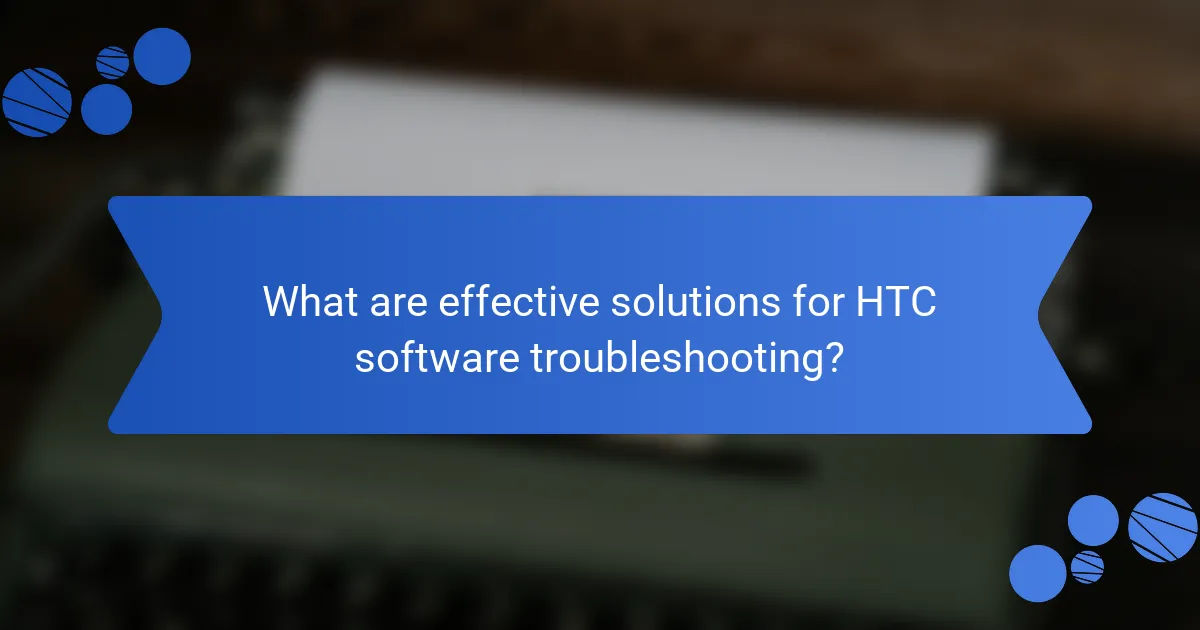
What are effective solutions for HTC software troubleshooting?
Effective solutions for HTC software troubleshooting include performing a factory reset, updating software, and clearing cache. A factory reset can resolve persistent software issues by restoring the device to its original settings. This process deletes all data, so backing up important files is essential.
Updating the software ensures the device has the latest features and security patches. Regular updates can fix bugs that affect performance. Clearing the cache of specific apps can also improve functionality by removing temporary files that may cause glitches.
These methods are widely recommended by HTC support and user forums. They are proven techniques for resolving common software problems encountered by HTC users.
How can users resolve common software issues on HTC devices?
Users can resolve common software issues on HTC devices by performing several troubleshooting steps. First, restart the device to clear temporary glitches. If the problem persists, check for software updates in the settings menu. Installing the latest updates can fix known bugs. Users can also clear the cache of specific apps to improve performance. This can be done through the app settings. Additionally, performing a factory reset can resolve persistent issues, but this erases all data. Backing up important files is essential before this step. If issues continue, contacting HTC support for professional assistance is advisable.
What steps can be taken to perform a software reset?
To perform a software reset on an HTC device, follow these steps. First, locate the “Settings” app on your device. Next, scroll down and select “Backup & reset.” Then, tap on “Factory data reset.” After that, confirm your choice by selecting “Reset phone.” The device will then prompt you to erase all data. Finally, tap “Erase everything” to complete the reset process. This method restores the device to its original settings, resolving many software issues.
How can users update their HTC device software to fix issues?
Users can update their HTC device software by navigating to the settings menu. They should select “About phone” and then tap on “Software updates.” The device will check for available updates. If an update is available, users can download and install it. This process can fix various software-related issues. Regular updates often include bug fixes and performance improvements. Users should ensure their device is connected to Wi-Fi during the update to avoid data charges. Keeping the software updated enhances device stability and security.
What troubleshooting techniques can help users solve specific problems?
Troubleshooting techniques that can help users solve specific problems include systematic approaches like restarting the device, checking for software updates, and resetting settings. Restarting clears temporary files and resolves minor glitches. Checking for software updates ensures the device runs the latest version, which may fix known bugs. Resetting settings can restore default configurations that may have caused issues. Additionally, users can run diagnostic tools provided by HTC to identify specific software problems. These techniques are proven effective in resolving common software issues, as documented in user manuals and technical support resources.
How can clearing cache and data resolve application issues?
Clearing cache and data can resolve application issues by removing corrupted or outdated files. Cache stores temporary data to speed up processes. Over time, this can lead to conflicts or errors. Data storage contains user settings and preferences. If corrupted, it can cause apps to malfunction. By clearing these, the application resets to its original state. This process often fixes freezing, crashing, or slow performance. Users frequently report improved app functionality after performing this action.
What is the importance of safe mode in troubleshooting HTC devices?
Safe mode is crucial for troubleshooting HTC devices. It allows users to start the device with only essential system applications running. This helps identify if third-party apps are causing issues. When in safe mode, users can isolate problems effectively. It prevents non-essential apps from launching, simplifying the troubleshooting process. If the device operates normally in safe mode, the issue likely stems from a third-party application. Conversely, if problems persist, the issue may be deeper within the system. Safe mode provides a clear environment for diagnosing software conflicts. This method is widely recommended for resolving various device malfunctions.
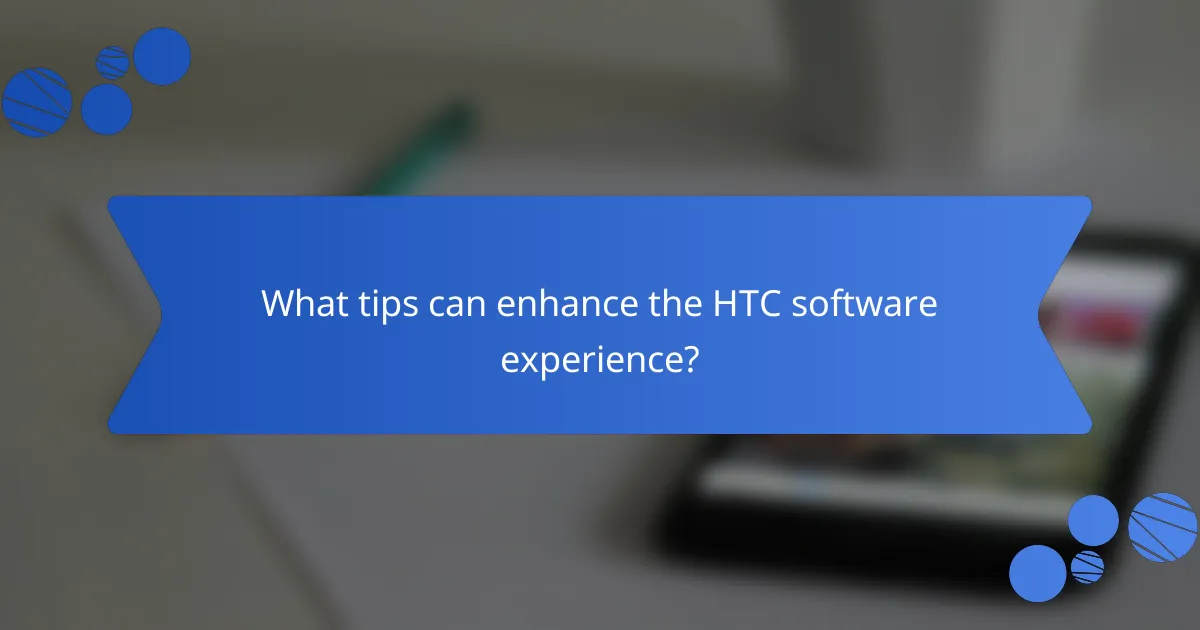
What tips can enhance the HTC software experience?
To enhance the HTC software experience, regularly update the software to the latest version. Updates often include performance improvements and security fixes. Utilize HTC’s built-in optimization tools to clear cache and manage storage. This can lead to smoother operation and faster response times. Customize settings to suit personal preferences, such as display options and notification settings. This personalization enhances usability. Additionally, consider using HTC’s support resources for troubleshooting common issues. Accessing online forums or user guides can provide valuable insights and solutions. Engaging with the HTC community can also enrich the software experience through shared tips and advice.
How can users prevent future software issues on their HTC devices?
Users can prevent future software issues on their HTC devices by regularly updating the software. Software updates often include bug fixes and performance improvements. Users should enable automatic updates for convenience. Regularly clearing cache can also help maintain device performance. Users should uninstall unused apps to free up system resources. Backing up data is crucial before major updates. Users should avoid downloading apps from untrusted sources to reduce risks. Finally, performing periodic factory resets can resolve persistent issues. These practices collectively enhance device stability and longevity.
What best practices should be followed for app management?
Best practices for app management include regular updates, monitoring app performance, and managing app permissions. Regular updates ensure that apps have the latest features and security patches. Monitoring performance helps identify issues like crashes or slowdowns. Managing app permissions protects user data and privacy. Additionally, uninstalling unused apps frees up storage space. Backing up app data prevents data loss during troubleshooting. Using app management tools can streamline these processes. Following these practices enhances overall app performance and user experience.
How does regular maintenance improve software performance?
Regular maintenance improves software performance by ensuring optimal functionality and efficiency. It involves routine updates, bug fixes, and system checks. These practices help prevent slowdowns and crashes. Regular updates can enhance security and compatibility with new technologies. Bug fixes address known issues that may hinder performance. System checks can identify and resolve potential problems before they escalate. According to a study by Microsoft, regular maintenance can improve system speed by up to 30%. This data supports the claim that proactive maintenance is essential for maintaining high software performance.
What resources are available for HTC software troubleshooting?
HTC provides several resources for software troubleshooting. The official HTC support website offers guides and FAQs for common issues. Users can also access forums where they can find solutions shared by other HTC users. HTC’s customer service can assist with more complex problems through direct communication. Additionally, software updates and patches are available on the HTC website to resolve known issues. These resources collectively help users troubleshoot software problems effectively.
How can users access support forums and communities for assistance?
Users can access support forums and communities for assistance by visiting official HTC websites and social media pages. HTC provides a dedicated support section on their website, which includes links to user forums. Users can also join HTC-related groups on platforms like Facebook and Reddit. These communities often share solutions and troubleshooting tips. Additionally, forums like XDA Developers focus on HTC devices and software issues. Engaging in these platforms allows users to interact with other HTC users and experts.
What official HTC resources can aid in troubleshooting software issues?
HTC provides several official resources for troubleshooting software issues. The HTC Support website offers guides and FAQs for common software problems. Users can access the HTC Community forums for peer support and shared solutions. The HTC Help app on devices provides troubleshooting tips and direct assistance. Additionally, HTC offers customer service contact options for personalized help. These resources are designed to assist users in resolving software issues effectively.
HTC software troubleshooting addresses common issues faced by users, including system crashes, slow performance, app compatibility problems, and connectivity failures. The article outlines the impact of software issues on device performance, signs of software malfunction, and methods for identifying specific problems. It provides effective solutions for troubleshooting, including software updates, clearing cache, and performing factory resets, along with best practices for app management and regular maintenance. Additionally, it highlights available resources for user support and the importance of proactive measures to enhance the overall software experience on HTC devices.
